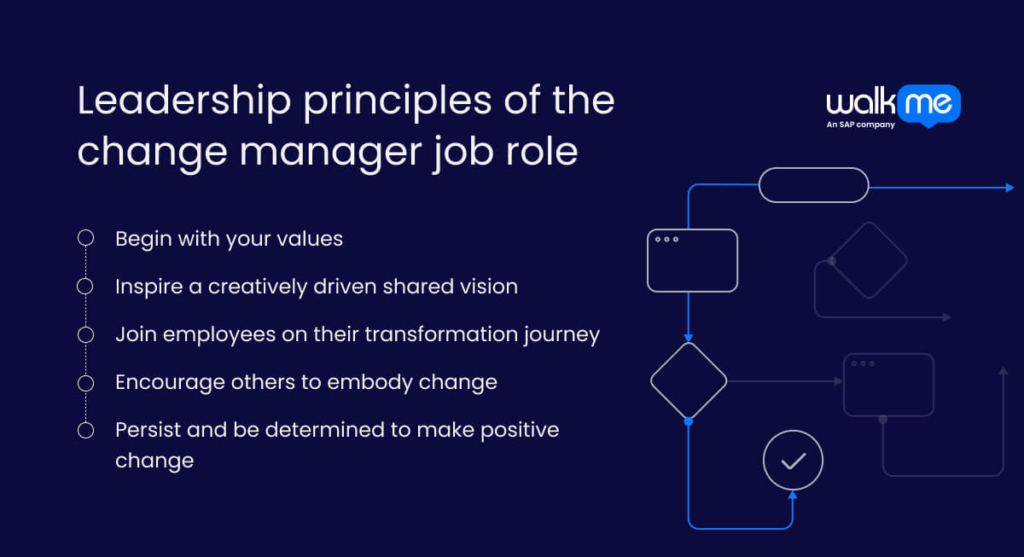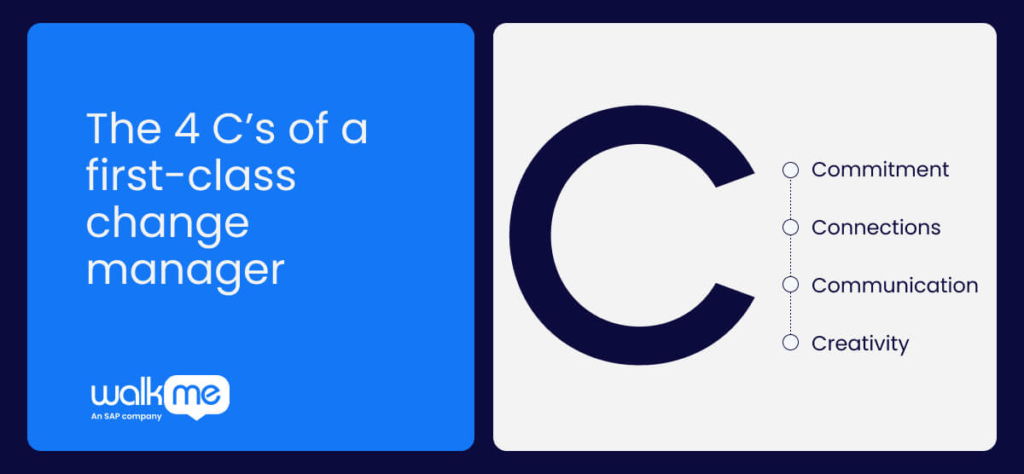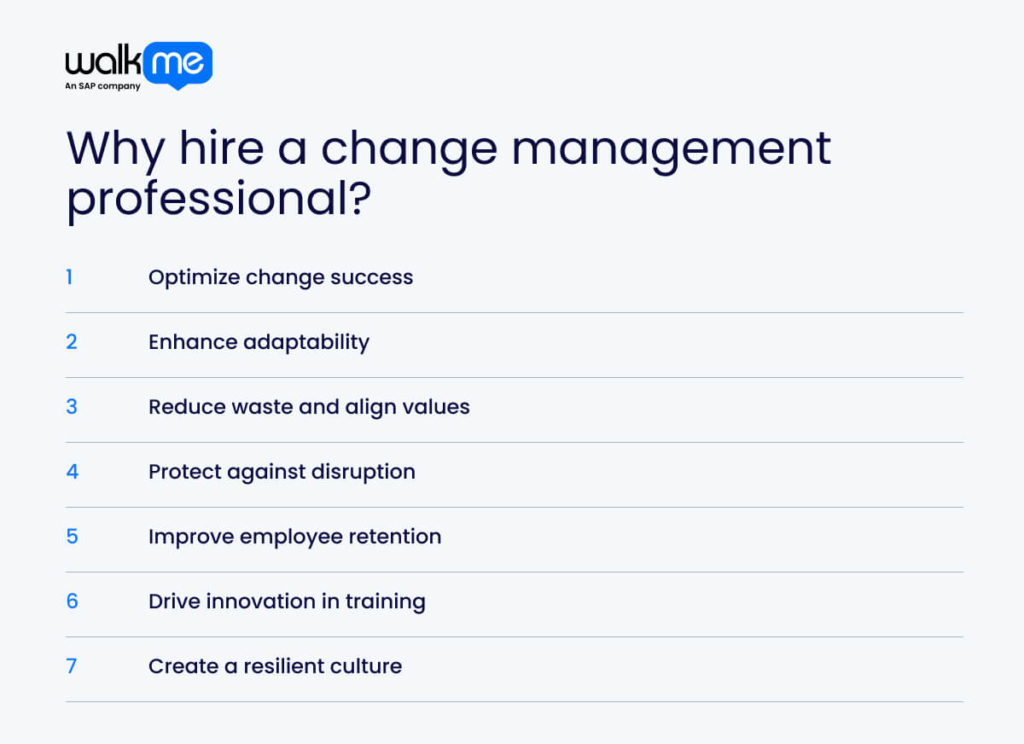A change manager is one of the most critical roles in business today.
Gartner reports that just 39% of employees feel able to respond to the changing needs of their business and the customers it serves.
Disruption in the industry requires quick thinking, expertise, and excellent support skills to help team members successfully navigate change. Change managers become indispensable within this environment.
Effective change management hinges on a skilled leader who can guide the organization through transitions, minimize resistance, and drive successful implementation.
But what does a change manager do? And what are the five leadership features of the change manager job role? These questions will be explored in detail, beginning with a definition of a change manager.
What is a change manager?
A change manager is a professional who guides organizations through transitions and transformations.
Change managers plan, implement, and oversee change initiatives, ensuring new processes or systems are adopted. They work to minimize resistance, communicate effectively with stakeholders, and align changes with business goals.
These leaders use various strategies to help employees adapt, measure progress, and address challenges that arise during the change process. Their role is crucial in maintaining productivity and morale while steering the organization toward its new objectives.
Change managers are usually senior leaders and can be certified, although change management certification is less crucial than some employers may believe. Experience in change management practices is of higher value to companies.
What does a change manager do?
Change managers guide organizations through transitions. They create and carry out plans to move companies from where they are to where they want to be.
Their job involves planning, developing strategies, and explaining why changes are needed. They determine what changes will cost and how they will affect the company.
A big part of their work is ensuring that changes go smoothly and helping employees adapt. They look at possible problems and find ways to avoid them.
Change managers monitor events, run meetings, and share information within the company. They also ensure that everyone’s needs are considered. To do well, they need both technical know-how and people skills.
Their role is key in ensuring that changes actually work and stick.
Change managers vs. project managers
While both roles are crucial for organizational success, change, and project managers have distinct focuses and responsibilities. Let’s explore the key differences:
Change managers
Change managers specialize in guiding organizations through transitions. They focus on the human side of change, helping employees adapt to new processes or systems. Their work involves creating strategies to overcome resistance, communicating effectively across all levels, and ensuring long-term adoption of changes. Change managers often deal with organizational culture, employee emotions, and behavioral shifts.
Project managers
Project managers, on the other hand, concentrate on delivering specific outcomes within defined parameters. They oversee the planning, execution, and closure of projects, ensuring they meet goals on time and within budget. Their focus is on tasks, resources, timelines, and deliverables. While they may deal with change as part of a project, their primary concern is the project’s successful completion rather than the broader organizational impact.
Change manager skills & traits
Change managers require unique skills and traits to guide organizations through transitions.
Let’s explore the key competencies and characteristics that define successful change managers:
Change manager skills
Change managers possess a diverse skill set crucial for navigating organizational transformations.
They excel in risk management, anticipating and addressing potential obstacles before they arise. Time management is essential, as they must balance multiple priorities and ensure timely completion of key performance indicators (KPIs).
Many employers value change management certifications as proof of expertise. Strong communication skills are vital for addressing resistance with empathy and effectiveness.
Change managers must also be adept at assessing an organization’s readiness for change, using various tools and metrics to gauge preparedness.
Change manager traits
Successful change managers exhibit specific traits that enhance their effectiveness. They excel at building and maintaining strong relationships, crucial for managing resistance and fostering cooperation.
Experience with past change initiatives provides valuable insights and practical knowledge. Passion for change management methodologies drives their commitment to increasing employee adoption rates.
Problem-solving skills and a deep understanding of organizational dynamics enable them to address complex issues effectively. Persuasive abilities and communication skills are essential for supporting training efforts.
These traits collectively ensure the long-term success of change initiatives through a strategic approach and relentless focus on sustainable transformation.
Leadership principles of the change manager job role

Key change management levers or features mark out the most successful change leadership.
Let’s take a closer look:
Begin with your values
Change managers must embody the change they want to see. Start by defining and overcoming your own obstacles to success. This approach makes you more credible and helps you understand how others respond to change.
It’s important to gain an appreciation for the transformation process. Before implementing company-wide changes, ensure all managers are on board and understand the benefits.
Inspire a creatively driven shared vision
Successful change leaders communicate an inspiring vision to employees. Whether natural or learned, this skill is crucial.
Effective change leaders excite their staff with a clear, easy-to-understand vision. They communicate goals consistently, helping employees identify with the company and unify under a common purpose.
Join employees on their transformation journey
Change managers wear many hats: strategist, leader, and coach. They must be present and available daily to fulfill these roles.
Maintain an open-door policy and show interest in your team’s success. Set an example of open communication and be clear about objectives and honest about mistakes. This approach keeps you aware of cultural changes and helps address issues quickly.
Encourage others to embody change
Focus on creating genuine change rather than forced enthusiasm. Give employees time to process changes internally. Encourage initiative and responsibility.
Help staff build confidence in facing new challenges. Promote networking among employees. Involve key stakeholders in decisions from the start to address potential problems early.
Persist and be determined to make positive change
Change managers must keep moving forward, even when progress seems slow. Expect setbacks, but don’t give up.
Stay open to adjusting plans while keeping the overall vision in mind. Celebrate small successes to boost morale. Avoid declaring victory too soon; ensure changes become part of the company culture before celebrating fully.
How to become a change manager
The change manager’s role is highly specialized and responsible.
Seeing your business grow due to carefully considered and innovative changes can be hugely rewarding. There are structured steps to becoming a change manager.
Let’s explore:
Complete your bachelor’s degree
To be an excellent change manager, you must understand how businesses operate and which processes cause positive or negative impacts on a company’s structure. A Bachelor’s degree in business administration, human resources, or economics will give you the tools you need to succeed.
Business degrees give students an understanding of how a company works, which students can achieve by completing other marketing and logistics degrees. The objective is to identify areas within the company that need improvement and, as a professional, what you can do about it using the tools available.
Most Bachelor’s degree programs take three years to complete; two-year accelerated programs are also available.
Continue further education in change management
You can specialize in project management by obtaining a related degree or getting a change management certification. If you want to lead the adoption of new technologies and manage organizational change, look into taking a Change Management Practitioner course. You can even take some of these courses online so that they can fit in with an excellent work-life balance.
Develop a resume and cover letter
Your resume and cover letter are crucial to landing a job after graduation. Even if you don’t have relevant work experience, focus on the transferable skills you’ve acquired during your studies, like managing change in a business context.
Your cover letter should highlight why you would excel in the role and state your dedication to professional development within the company. If you and your potential employer have compatible long-term goals, expressing interest in a change management position may result in being offered that role.
Send applications for open roles in business administration
Obtain the business administration skills you need by applying to open positions that will help you develop. By doing this, not only will your resume continuously be optimized, but it will also be easier to send it to HR.
However, update your resume each time you apply to tailor it to the critical competencies required for each position.
Build business administration experience
Before changing a company’s operations, you must understand how they work. Talk to employees in different departments and learn about their roles and responsibilities.
Once you know the current state, start thinking about modernizing and streamlining tasks to make them more efficient.
Ideally, a change manager should have previous experience in operations management; some universities might even require it for admission into specific degree programs, such as a Master’s degree in Project Management.
Achieve a master’s degree
Mastering project management can help you change a company’s operations. The program teaches students how to successfully begin and end projects while developing crucial skills such as time management, communication, and budgeting.
If you want another graduate route, consider getting your Master of Business Administration, which will allow you to become a business leader.
However, qualifications and experience must make change managers reflect on the central force behind effectively driving change. They must constantly ask themselves whether they focus on the exemplary aspects of change management.
The 4 C’s of a first-class change manager

Change managers can ensure they embody the four Cs of success to inspire employees to an effective transformation strategy.
Let’s explore:
Commitment
Top change managers are dedicated to their role and those affected by changes. They constantly develop their skills, empathize with staff, and support them through transitions. This approach builds trust and creates personalized plans for successful transformations, achieving project goals while positively impacting organizational culture.
Connections
Effective change managers understand the links between people, projects, processes, and outcomes. They influence all levels of the organization, grasp project impacts, improve business processes, and align results with the company’s vision and goals. This comprehensive approach ensures measurable and sustainable outcomes.
Communication
World-class change managers communicate openly and honestly. They understand employees’ strengths and weaknesses, align messages with people’s concerns, and create achievable change outcomes. They excel at sharing lessons learned and celebrating successes, fostering a positive change environment.
Creativity
The best change managers use creativity to develop innovative ideas. They make complex concepts understandable and break large projects into manageable tasks. These managers think outside the box and are always open to trying new approaches, driving effective and engaging change processes.
Why hire a change management professional?

Hiring a change management professional can significantly impact an organization’s ability to navigate transitions and thrive in a dynamic business environment.
Here are several key reasons why companies should consider bringing these experts on board:
Optimize change success
Change management professionals are crucial in today’s fast-paced business world. They ensure critical projects and initiatives achieve their goals, maximizing the return on investment for change efforts.
Enhance adaptability
These experts effectively manage change, helping organizations stay competitive and adaptable in a rapidly evolving business landscape.
Reduce waste and align values
Change managers minimize resources wasted on unsuccessful changes. They also work to align organizational values with actual practices, ensuring consistency across the company.
Protect against disruption
By implementing effective change strategies, these professionals help shield organizations from future disruptions and maintain a uniform change philosophy.
Improve employee retention
Change managers support staff during transitions, improving employee retention and maintaining a stable workforce, which improves the company’s bottom line.
Drive innovation in training
These professionals continuously develop and implement innovative training methods, helping staff cope with constant changes and improving overall organizational skills.
Create a resilient culture
Ultimately, change managers embed adaptability into company culture, fostering a more agile and resilient organization better prepared to face future challenges.
Evolving into an effective change manager
Change management requires a diverse skill set. Critical thinking, strong communication, and organizational development expertise are crucial for boosting employee adoption.
However, these skills are most effective when paired with the ability to build strong relationships.
Successful change managers use outstanding communication skills to influence how employees perceive change. They convey the need for change meaningfully, helping achieve program objectives.
Hiring a skilled change manager is vital for optimizing growth and building resilience for the future. Ultimately, change becomes significant when managers focus on developing exceptional communication skills.
These skills unlock strong relationships with staff, paving the way for successful transformations and a more adaptable organization.

